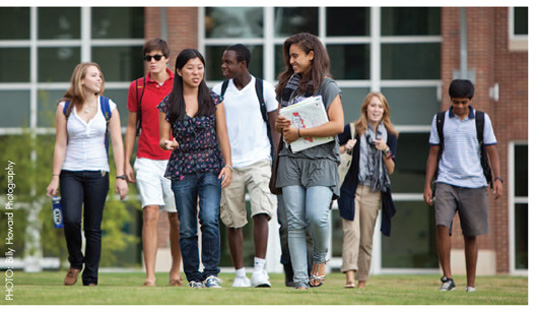The Importance of Accreditation
Setting the standards for success
by Ruth E. Dávila

As you begin to investigate education choices for your children, you will consider many factors in your quest for the right school. One key area to explore is accreditation, an independent seal of approval schools voluntarily seek from private agencies to indicate that they have met certain standards.
Accreditation is a process whereby a school gains recognition for excellence through a vigorous examination process, which is both self-reflective and confirmed by external educators,” says Damian Kavanagh, vice president of accreditation and school services for the Southern Association of Independent Schools (SAIS).
Today, a majority of schools hold an accreditation, which comes into play at two major junctures: when your child transfers to another school or applies for college. If you are in the process of moving your child from one school to another—whether transferring within Georgia or from another state—you may already be seeing the impact of school accreditation.
According to the Georgia Board of Education, all public schools must accept transfer
credits from any school accredited by one of three agencies: the Southern Association of Colleges
and Schools (SACS), the Georgia Private School Accreditation Council and the Georgia Accrediting Commission.
If you are transferring in state, your child’s credits will more than likely transfer. However, differences between state education requirements
might complicate matters for out-of-state transfers from schools not accredited by SACS. For the most accurate information about how your move might affect your child’s educational standing, contact your child’s new school directly with allsupporting documents like transcripts
ready for their review.
The simplest way to find out whether a school is accredited is to check with the school via its website, in person or by phone. If the accreditation’s validity is in question, double-check with the accrediting agency directly.
Most Georgia schools are accredited through SACS through its parent company, AdvancED.
Several other agencies operate locally, regionally and nationally and range from faith-based to those specializing in the accreditation of independent schools, like SAIS.
While some accrediting bodies are called “agencies” and others “associations,” they function
similarly. The main distinction is that associations typically offer a membership
option to schools before they complete the accreditation process. Schools might pursue membership for networking and professional development.
Membership, however, is not to be confused with accreditation. Accrediting agencies generally follow the same standards when evaluating schools, which range from financial stability to a focus on improving student performance. Religious accrediting associations evaluate additional factors to ensure the school reflects the theology and values at hand.
With nearly identical standards, the real differentiator among agencies is their approach to the peer review process. At a minimum, an agency should require that at least one evaluator review the school. A more thorough process—and the prevalent practice—is to conduct reviews by a panel of educators.
SAIS compiles a peer group of diverse backgrounds, pedagogy and school cultures to visit applicants. These groups usually consist of a school head, a business manager, teachers and an administrator. In addition to evaluating documents and other evidence, SAIS reviewers sit down with students at the lunch table and in the classroom. They try to attend a cultural event, like a play. And they talk to various stakeholders, such as parents, board members and neighbors.
Independent schools in Atlanta routinely seek dual accreditation from both SACS and SAIS. As the largest regional body, SACS grants a sense of universality to the accreditation, while SAIS ensures that the independent school context is considered.
The Atlanta International School (AIS) holds two accreditations: nationally through SACS/SAIS and globally through the Council of International Schools. Headmaster Kevin Glass says, prior to external review, AIS’ self-study illuminated areas for synergy throughout the pre-K to grade 12 curriculums. For example, it sparked the idea of team-teaching certain subjects or linking certain projects with those in other units.
Accreditation also eases eligibility for financial
aid and college scholarships like HOPE.
Kennesaw State University receives a bevy of new applicants each semester. While transcripts
from accredited schools are easier to review,
the university doesn’t automatically rule out students from schools without accreditation for acceptance or aid.
“There is a portfolio method (exhaustive curriculum review) for students who graduated from non-accredited high schools,” says Susan Blake, associate dean for Enrollment Services and executive director of University Admissions.
“We require additional testing from them, since we would not be able to verify their college
preparation,” Blake adds.
In the end, Kavanagh says, parents should seek the school that’s the best fit for their child. Accreditation is not likely to be the central consideration,
but it is a good indicator that the school strives to improve every year. “Like our students, whom we expect to grow and change as they grow older, we expect schools to do the same thing.”
Accreditation and Associations
Here are some accrediting organizations and associations that
help to set certain standards of excellence in education.
Association of Christian Schools International (ACSI)
www.acsi.org ACSI strives to enable Christian educators and schools worldwide to effectively teach using Christ-centered curricula and programs.
Georgia Private School Accreditation Council (GAPSAC)
www.gapsac.org Association of K-12 private schools whose students are recognized and approved by the Georgia DOE for transferring credits to public schools on the same basis as students from public schools.
 Department of Education (DOE)
Department of Education (DOE)
www.doe.k12.ga.us A statewide, policy-driven organization governing the public school system of education in Georgia for K-12,
the DOE operates under the direction of
the State Superintendent of Schools.
Georgia Accrediting Commission (GAC)
www.coe.uga.edu/gac GAC offers four levels of approval: preparation status, provisional accreditation, accreditation and accreditation with quality.
Southern Association of Colleges and Schools (SACS)
www.sacs.org Member schools meet research-based standards and maintain continuous school improvement and quality assurance.
Its mission is the improvement of education
in the South through accreditation.
Southern Association of Independent Schools (SAIS)
www.sais.org SAIS compiles a group of diverse backgrounds and school cultures to visit applicants. Members meet quality standards, receive peer evaluation and implement a plan focused on strategic improvement.







